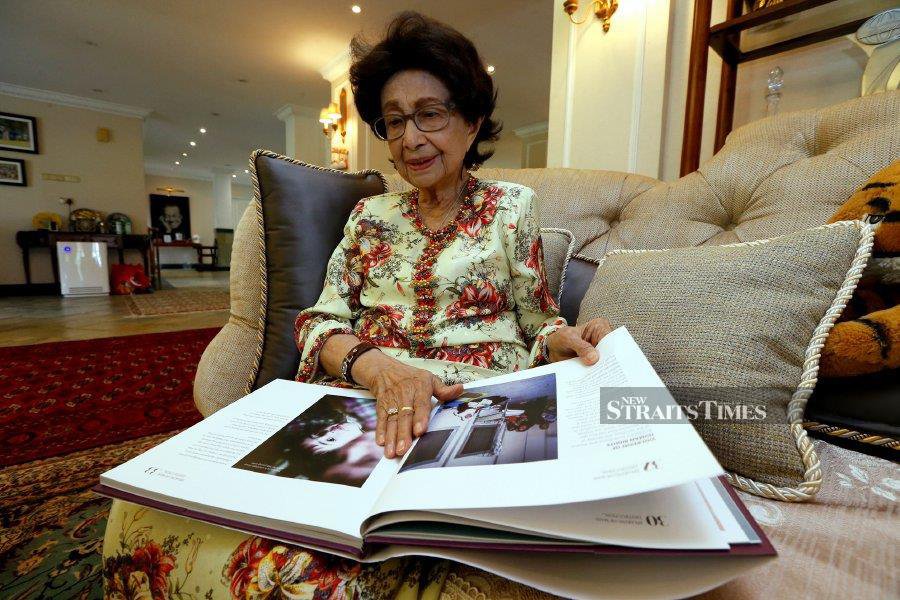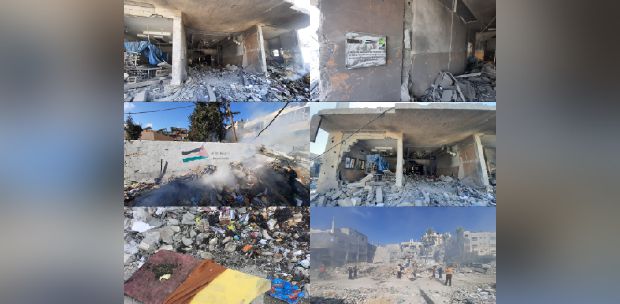THE tiny stones on her ring sparkle and dance, flashing to the beat of her slender fingers as they glide across the ivory and occasionally bang on a key for emphasis. "I don't see so well now. Sometimes, the black and white (keys) just seem to blend together," utters a soft voice, the tone laced with both apology and discernible frustration.
"What song would you like?" The elegant lady seated in front of the piano asks, her fingers poised on the shiny white keys whilst her kindly eyes behind her glasses take on a faraway look.
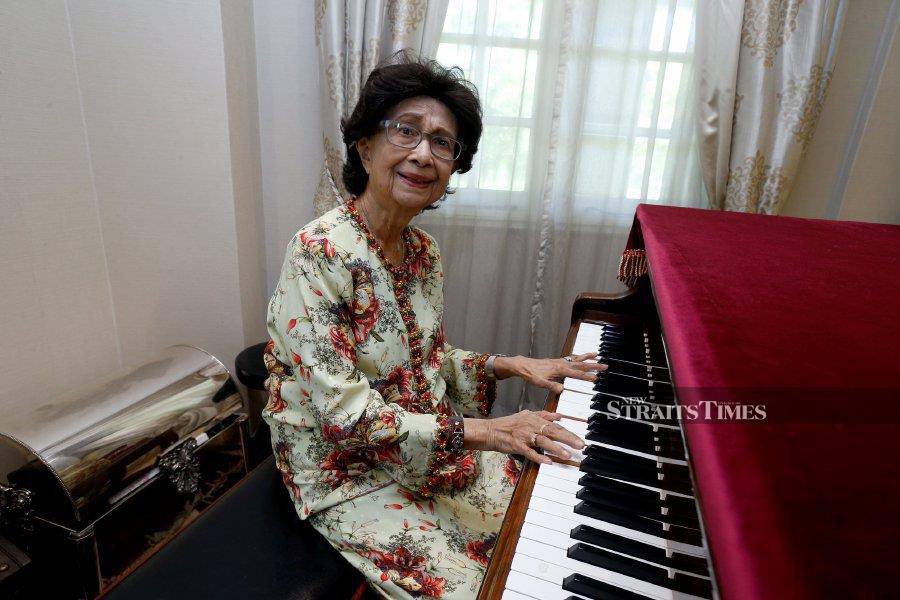
Someone suggests a song, and she happily obliges. Once again, the cosy living room of Malaysia's former first lady, Tun Dr Siti Hasmah Mohd Ali, permeates with laughter and joyous singing to tunes that hark back to a bygone era.
The merriment is certainly worlds away from the world that she's written about in her recently launched coffee table book, Speaking of Mass Destruction, about her humanitarian fact-finding mission to Baghdad back in 2000, to witness the extent of the catastrophe which had befallen Iraq as a result of the punishing economic sanctions imposed on the country by the United Nations (UN) in 1990.
But for now, those memories appear far from her mind as she joins the little group huddled around her piano in a nostalgic rendition of Dean Martin's Come Back to Sorento, a favourite song of her husband's, Tun Dr Mahathir Mohamad.
REMEMBERING SADDAM HUSSEIN
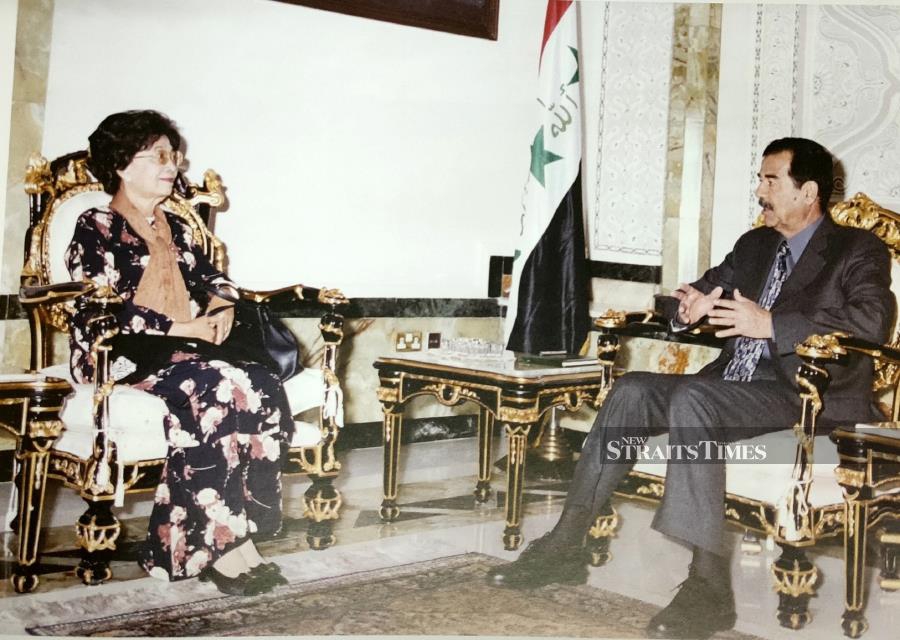
Heart pounding, she casts a furtive look at the dignified-looking man on the other side of the hall. Nudging her glasses closer to her eyes, she notes that there are two other men with him, seated behind the small wooden table.
"Interpreters," whispers HE Adnan Malik, the ambassador of Iraq to Malaysia, one of two dignitaries (the other is deputy prime minister, Tariq Aziz) who's come to accompany her on this hush-hush visit to the Presidential Palace to meet with Iraq's President, Saddam Hussein. The little group around the table appear deep in conversation, but of course, there's no way of knowing what they're talking about.
"But the moment he spotted me standing by the doorway, Saddam got up and came towards me. He held out his hand as he got nearer and I took it," recalls Siti Hasmah, her soft voice slicing into my reverie as I find myself imagining what the fateful meeting with the late Saddam Hussein, one of the world's most controversial figures, must have been like.
The joyous strains of her piano-playing earlier still lingering in the air, Siti Hasmah settles herself on the couch in her living room to continue with her story, a stuffed (soft toy) tiger hugged tightly against her chest.
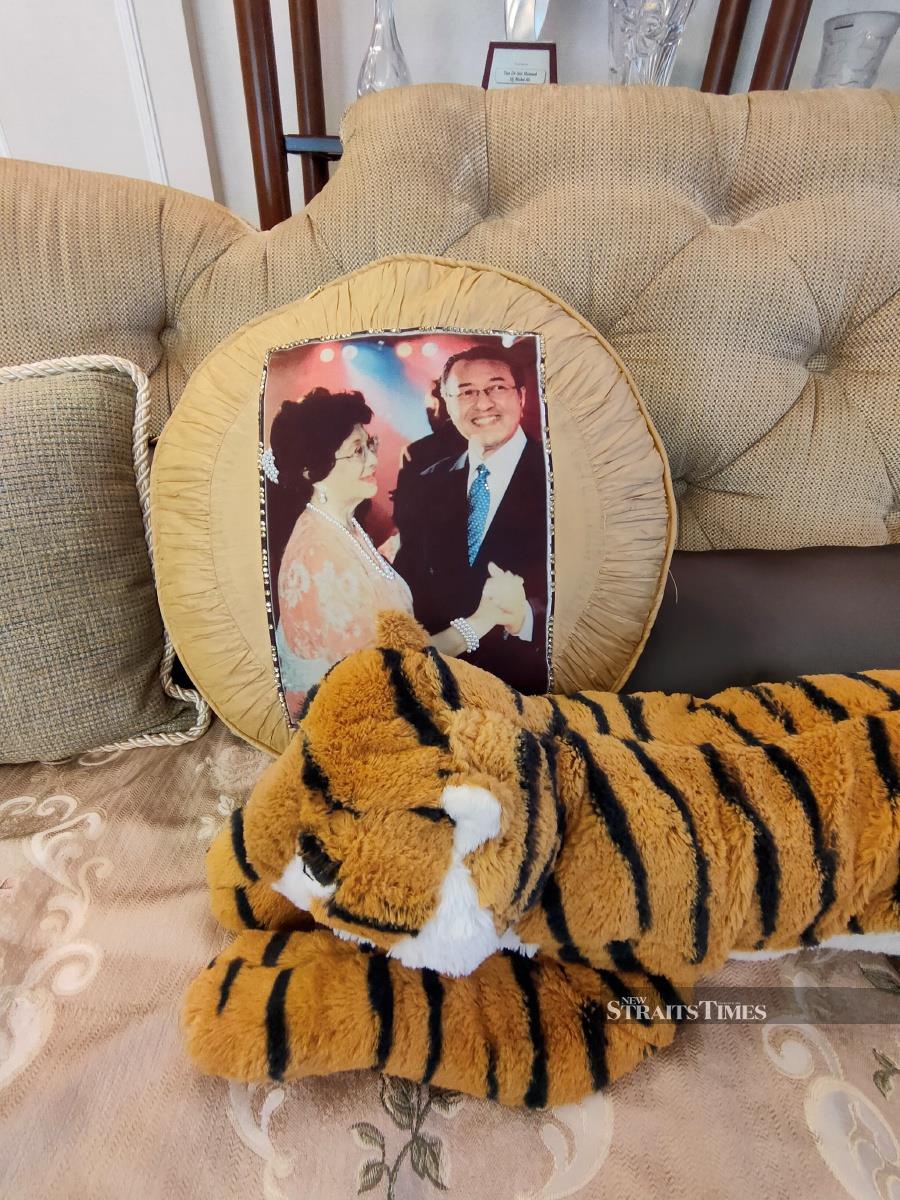
Next to her, occupying pride of place, is a small cushion with a picture of a younger Siti Hasmah in the arms of her dashing husband. "Couple goals," I smile to myself before looking up expectantly at the lady in front of me to resume her tale.
"The first thing he did was to thank my husband, Mahathir, and Malaysia for supporting his appeal to ask the United Nations (UN) to lift the sanctions imposed upon Iraq. In turn, I told him about our mission and that my delegation comprised only women," continues Siti Hasmah, 95, brows furrowing in recollection.
(The UN Sanctions on Iraq marked the beginning of the end of the Iraqis normal life. The sanctions prohibited trade and foreign direct investments, a freeze on government and personal accounts abroad, and imposed exacting regulations on foodstuff and medicines.
Iraq was also prohibited from exporting its oil and gas in the first five years of the sanctions, a devastating blow to a country that sits in the top five for oil reserves and lay second, just after Saudi Arabia, as oil producer.)
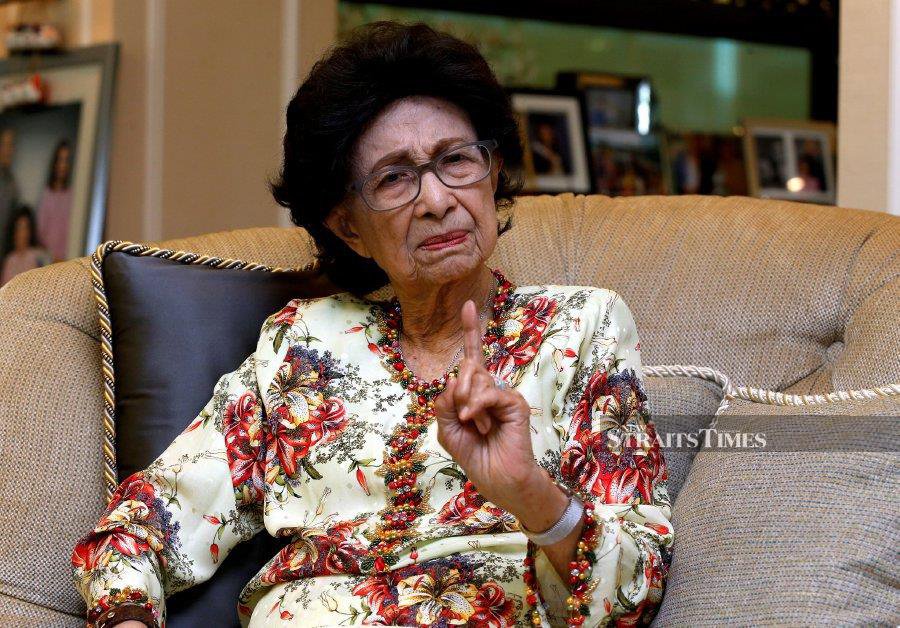
She remembers that Saddam spoke through an interpreter. "I don't know whether he knew how to converse in English. We never found out," she muses, before sharing that Saddam, through his interpreters, told her about the sad state of his country.
"He talked about the places that were impoverished due to the sanctions. I just listened. It was quite tedious to conduct a conversation through interpreters. I fear that a lot must have gotten lost in translation!" exclaims Siti Hasmah.
The visit lasted for more than an hour, she recalls. Did he serve you anything to eat or drink? I couldn't help blurting out. She shakes her head, replying wryly: "No, not even water. But then again, I don't think I would've wanted to drink anything. Better like that!"
When it was time for her to leave, the grandfatherly figure of Iraq's leader shadowed her to the big door, above which was a huge sculpture of an eagle with outstretched wings. The bird, she duly learnt from her host, had been crafted from used bullets from the Iraq-Kuwait war.
"Its face was facing towards Iran so I guessed the next victim was going to be Iran," remembers Siti Hasmah, before musing aloud: "That's what people see in him. Always planning to invade this and that. A controversial figure, a murderer, a dictator… yes, he's all that. But at that time, I never saw those things. He was just like a soft-spoken grandfather."
At the moment of farewell, Saddam took her hand again, she recalls, eyes behind her glasses misting at the memory. Adding, she says: "Little did I know then that his farewell gesture was going to be the last he'd be exchanging with anyone from this part of the world."
The man, whom Siti Hasmah described in her book as being like a "gentle giant who was fighting for his people", and who served as the fifth president of Iraq from the years 1979 to 2003, was sentenced to death by hanging in 2006, after being convicted of crimes against humanity by the Iraqi Special Tribunal for the Dujail massacre — the killing of 148 Iraqi Shi'ites in the town of Dujail — in 1982, in retaliation for an assassination attempt against him.
CLOSE CALL
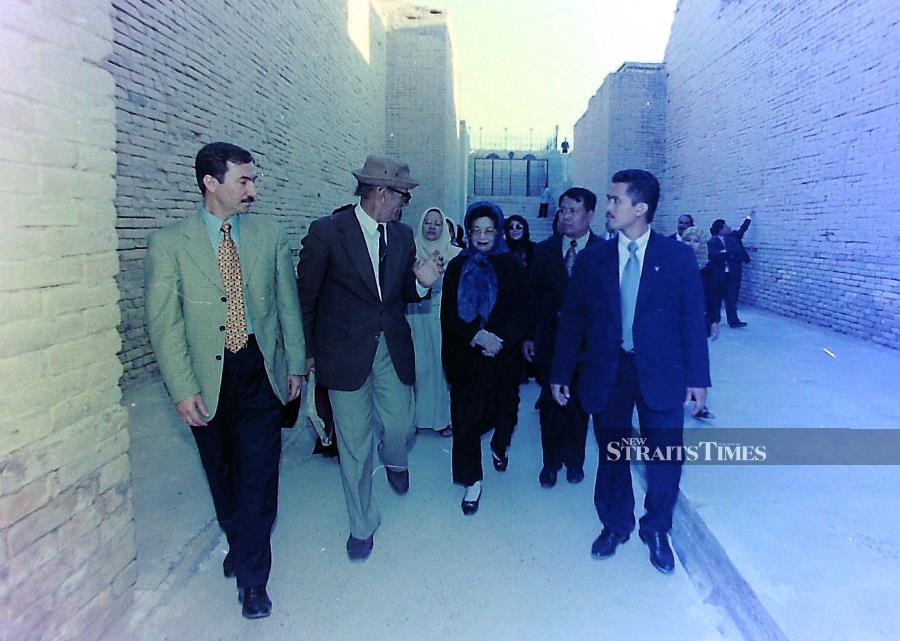
Siti Hasmah shares that the meeting with Saddam left a lasting impression on her. "It was my honour and privilege to have met this leader who did what he thought was right for his people and country," she'd written in her book.
Did you call your husband the moment you returned, I ask, an image of a very concerned — and angry — Mahathir floating into my periphery all of a sudden.
To my surprise, Siti Hasmah chuckles in response, before replying: "Once our meeting was over, I left straight away. The first person to meet me at the guesthouse was Supt Mohamad, the Chief of Security (who went on to retire as Senior Assistant Commissioner of Police), who was tasked with looking after our group. The moment I stepped into the building, he reprimanded me!"
Not surprisingly, Mohamad was livid. "I can still remember his angry words!" exclaims Siti Hasmah, her tone bemused. What did he say, I interject, curious, and unable to imagine that anyone would dare to raise a voice to the Prime Minister's wife!
A sheepish smile flickers across her face. "He said, 'Do you know I could've lost my job if we'd lost you!' He was so worried and angry sampai menangis di buatnya (until I could cry). Dia marah saya macam dia marah budak kecil (he told me off like he was telling off a child)! He was scared that if anything were to happen, he'd be responsible. I explained that I was told not to divulge anything."
Continuing, she says: "When he saw that I was close to tears, he said, 'You better speak to your husband!' By the way, do you know I've never been scolded by anyone other than my husband before?"
The Chief of Security, whom Siti Hasmah salutes for having the gumption to do what he did, gently led his special charge to the garden so she could call Mahathir on the satellite walkie-talkie which only the Special Branch used.
Patting the stuffed tiger absently, Siti Hasmah shares that the first thing her husband asked her after she'd told him about her little "outing" was whether she was okay. "I said I was fine and that Saddam Hussein sent his regards and gratitude," she reveals, adding that Mahathir never scolded her and that it was a comfort to finally get the chance to talk to her husband.
Why didn't you call him BEFORE you did anything, I couldn't help asking.
"Because I couldn't," she replies, matter-of-factly, before explaining: "Prior to our trip, Wisma Putra gave us a briefing on the do's and don'ts. One of them was that there'd be no contact with Kuala Lumpur (unless by satellite). Those who had loved ones who were ill were advised not to go."
THRILLING ENCOUNTER
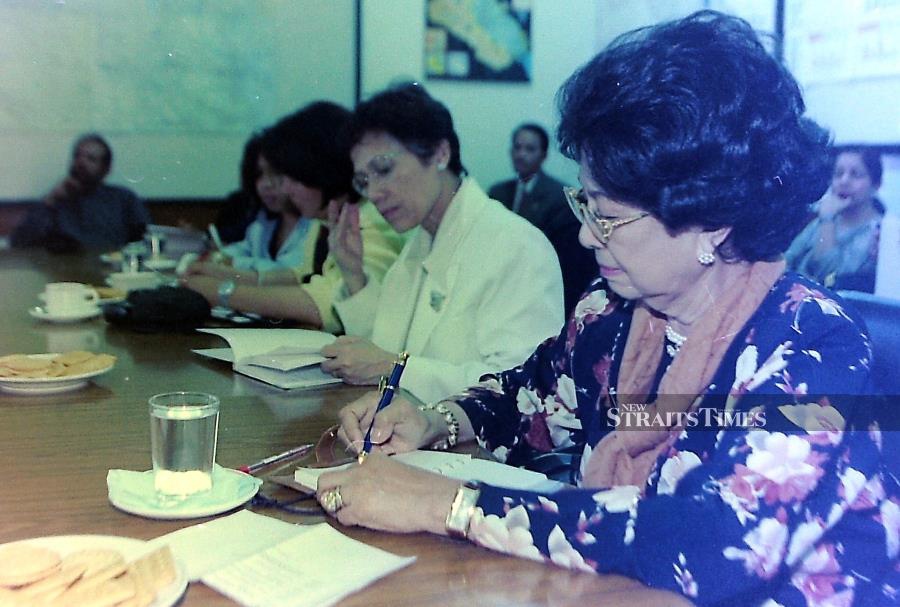
Sheepishly, she confides that Mahathir did advise her against paying a courtesy call on Saddam. Unless he requested, that is. And that request came on the morning of the group's second day in Baghdad. HE Adnan Malik sought an audience with Siti Hasmah and quietly informed her of his president's wish to meet with her — alone.
"What could I do? Saddam asked to meet. And that no one must be told," she says, voice calm, before proceeding to share that the moment she heard of the request, her head whirled in confusion. When would she need to go? Where? And why alone?
Her worries were allayed by Adnan, who told her that she'd be receiving someone from the president's office who'd give her a signal. As it happened, Siti Hasmah was in the midst of briefing her group members on the day's programme.
"I remember this Iraqi gentleman came and stood for a moment opposite me. He then nodded his head as an indication that it was time. That was the clue to leave for the Presidential Palace," she recalls, her head bobbing knowingly at the memory.
Was she in the least bit scared? The mother of seven, who was at the time 75, shakes her head. "No, I wasn't. As I stood up quietly to go, I remember Dr Raj Karim (from International Planned Parenthood Federation/PPSEAWA — Pan Pacific and South East Asia Women's Association) asking me where I was going. I just replied, 'Nowhere. Just taking a breather.' Obviously, she wasn't satisfied with my answer."
Dr Raj proceeded to follow her out towards the waiting car and grew more apprehensive when she noted that her friend was going alone, accompanied only by an Iraqi driver and officer.
"She told me to be careful and I, in turn, told her that I'd enlighten everyone upon my return," recounts Siti Hasmah, one of the first Malay woman doctors in then Malaya, having graduated in 1955 as a medical doctor from the Faculty of Medicine, Universiti Malaya, then located in Singapore.
Thus ensued a memorable ride to the secret rendezvous. "I was alone in the car with two Iraqi men. I didn't have time to think about being raped, shot or anything. There was a convoy of some sort. I remember they drove round and round and didn't go straight to the Palace. Nak mabukkan saya lah tu (to confuse me) so that I wouldn't know where they were taking me," she recalls, eyes dancing at the memory.
Then, chuckling wryly, the former chairman of Bakti, the Welfare Association of Wives of Ministers and Deputy Ministers, adds: "Silently I was telling myself they needn't have done all that because even in Kuala Lumpur pun aku tak tahu jalan. Apa lagi kat sini (I don't know the way. What more here?)! I wasn't afraid but I was praying hard. I kept telling myself that Insya Allah, God's with me."
She remembers there being a stop at one point during the journey, which she presumed was for a pick-up of the then-Deputy Prime Minister, Tariq Aziz. "I was so happy to see him because he spoke English," shares Siti Hasmah, adding that after what had seemed like forever, they finally arrived at the destination.
And her eventual audience with the man with the dubious distinction of being the best-known Middle Eastern dictator.
UNEXPECTED MISSION
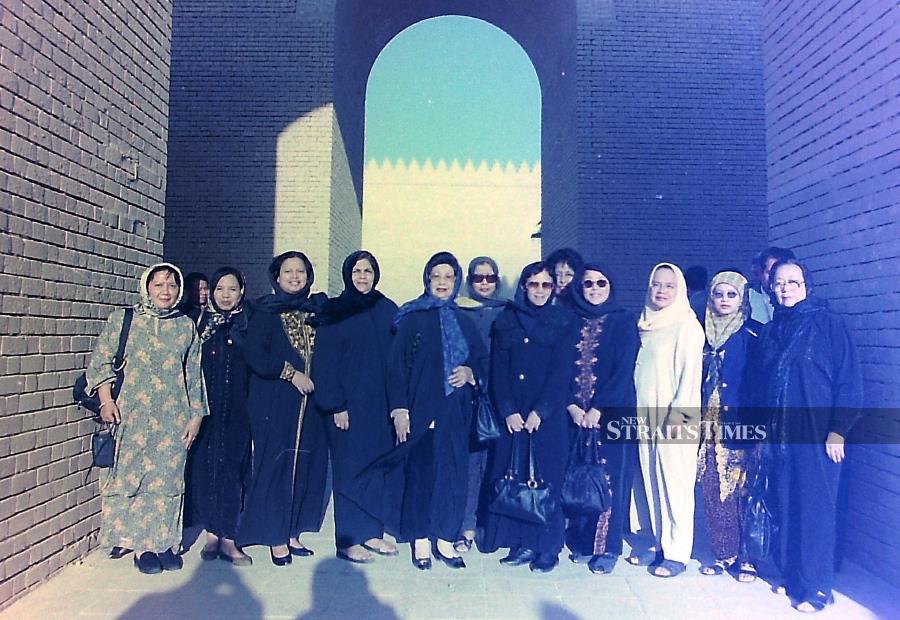
It all began one evening, when then prime minister Mahathir asked his wife if she could do him a favour. He was concerned about the continued sanctions imposed on Iraq and felt that Malaysia should pay the country a visit and validate what was really happening there, shares Siti Hasmah, rewinding back to the time when she was approached.
"He asked me to organise a goodwill trip to Baghdad and look at the conditions there from various aspects, namely education and health, to general welfare, to gauge how the people, especially women and children, had been affected," wrote Siti Hasmah in her book.
"To be honest, I was a little puzzled by his request," confides Siti Hasmah, adding: "To go to a conflict area? And especially me, being the prime minister's wife, kan? I mean, I'd go places for my own organisations, for counsellor meetings and whatnot. But for foreign relationship?"
Then her husband explained it very simply. He wanted his wife to go with a group of women, only women, to validate what they'd seen on TV and read in the Press about Iraq. If the disturbing reports could be ascertained, then Malaysia would join other international voices to seek a stand-down for the sanctions.
Finally comprehending her husband's intentions, Siti Hasmah didn't need much persuading. Chuckling, she says: "I was 75, my eyes were still bright, and I was energetic and active too, despite my age. My husband caught me at the right time! I wasn't in the least bit scared. But to be honest, I had no idea what I was going to find."
The next thing she did was to select the all-woman team who'd accompany her on this three-day mission. Her husband told her it'd be best this way as it would underscore their intention of it being a friendly visit.
Siti Hasmah went on to assemble a team comprising 10 other women from various non-governmental organisations. They included Toh Puan Dr Aishah Ong (Bakti), Datin Noorhayati Kamaluddin (Bakti), Assoc Prof Datin Dr Mizan Adiliah Ahmad Ibrahim (Bakti/Universiti Putra Malaysia), the late Datin Siti Aishah Ghazali (Bakti), Datuk Dr Raj Karim, Prof Datin Dr Sharifah Hapsah Syed Hasan Shahabudin (National Council of Women's Organisation/National Advisory Council on the Integration of Women in Development (NACIWID) Universiti Kebangsaan Malaysia), the late Datuk Ruby Lee (Malaysian Red Crescent Society), Assoc Prof Datin Dr Rashidah Shuib (Universiti Sains Malaysia), the late Dr Cynthia Gladys Lopez (Universiti Malaya Medical Centre), Aishah Ali (NACIWID)/New Straits Times (NST)) and Hamsiah Abu Bakar (NST photographer).
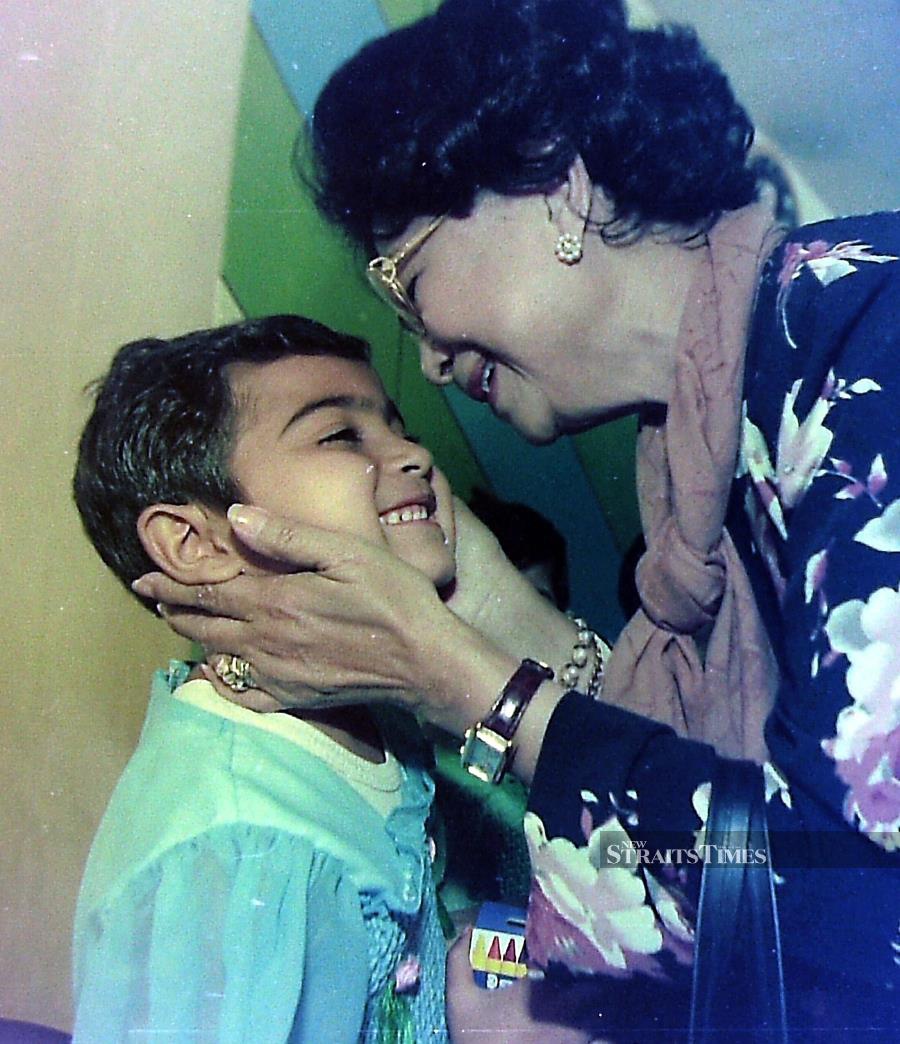
In their packed programme was a meeting with the Iraqi Red Crescent and General Federation of Iraqi Women Members, followed by visits to a school, the Al Iman Intermediate School for Girls, and the Al Amiriyah bomb shelter.
The entourage was also scheduled to visit the Saddam Children's Hospital Al Mansour and Al-Waziriah Orphanage. A trip to an old folks' home at Baghdad Jadidah was planned too as well as a meeting with UN agencies, including with former UN Humanitarian Coordinator, Hans-Christof von Sponeck, whose accounts of the sanctions would prove to be vital to their eventual report.
Plans were also made to visit the Iraq Family Planning Association (IFPA) as well as to have tea with Malaysian students in Baghdad. Their final day would see them visiting one of the seven wonders of the ancient world, the Hanging Gardens of Babylon; something Siti Hasmah wouldn't have agreed to had there not been a hospital for them to visit near there!
CYCLE OF DEATH
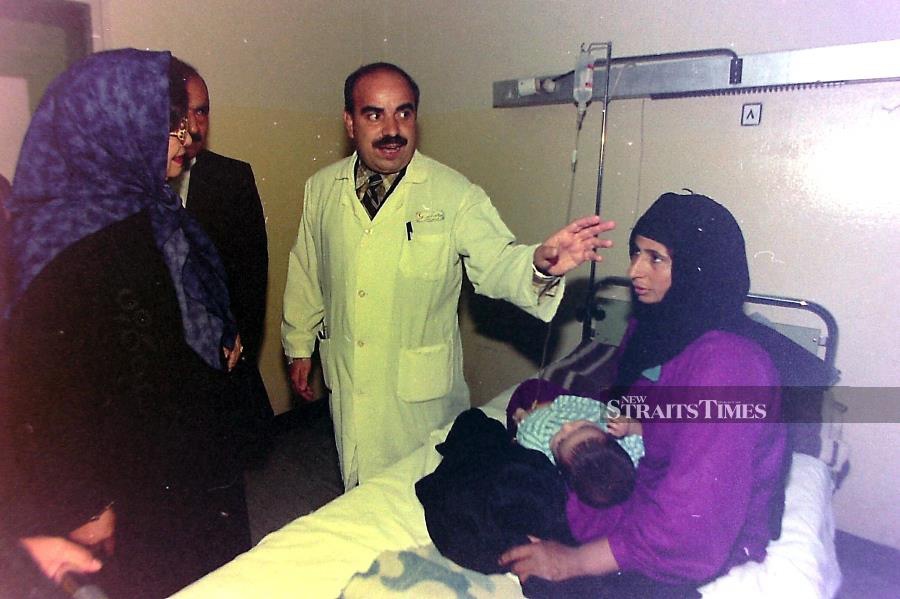
Their first sight of Iraq's capital, Baghdad was a disturbing one. The second largest city in the Arab world after Cairo was blanketed by a thick white smog, which they learnt was due to the US Air Force's bombing of the city's industrial infrastructure during the Gulf War in 1991. The country had been left completely decimated thanks to air raids and missile ambushes. And with the sanctions enforced, nothing could be restored.
Asked about her visit to the hospitals, Siti Hasmah grows discernibly solemn. Her eyes look pained as she describes the tragic faces of the children she met. The hospital wards were bursting at the seams and doctors tended to their charges enveloped by a sense of hopelessness. It was the same story everywhere they went.
"It'd been 10 years since the sanctions and the total number of deaths had reportedly risen to 1.5 million, 500,000 of whom were children," she wrote in her book. According to a World Health Organisation report (WHO), about 200 children had died on a daily basis. Chronic malnutrition was cited as one of the causes of death, with two babies dying of malnutrition every day.
"Ya Allah, the children were sharing oxygen masks and pregnant mothers were sharing beds. The hospitals had nothing. Because nothing was allowed in. If any of the equipment became faulty, like the ventilators, for example, they couldn't do anything. So many things weren't working," shares Siti Hasmah, recalling her visit to the Saddam Children's Hospital Al-Mansour in Baghdad.
Continuing, she says: "I remember we wanted to bring in pencils for the school children. But we weren't allowed to do so. It was the sanctions' rules. They feared someone might try to make bombs out of the graphite or mercury. So, we brought crayons instead. And books and Kit Kats."
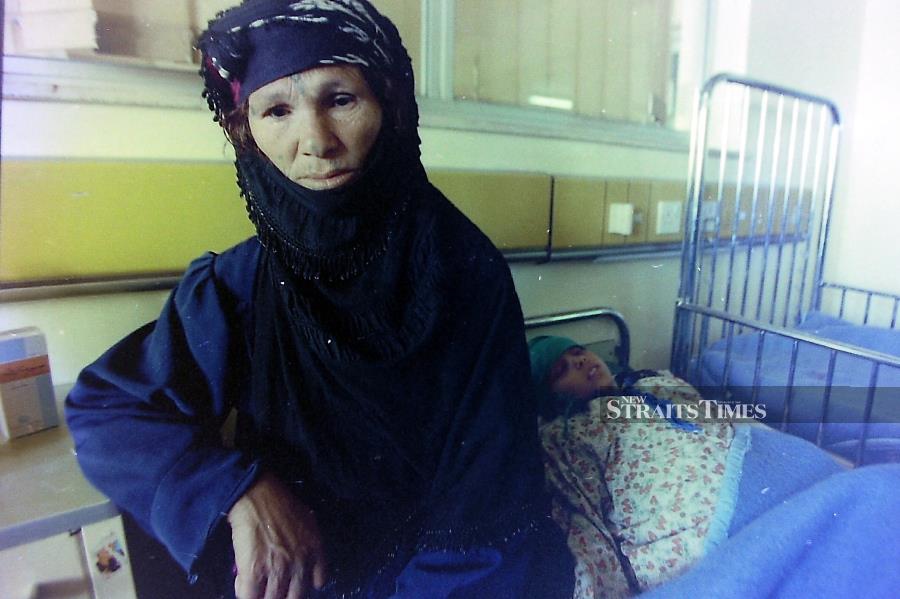
The group visited about four to five hospitals, says Siti Hasmah, and all requested for medicines. "We walked around the wards and were briefed by the doctors. We had antibiotics with us, which we passed to the respective hospitals at the end of our visit."
TIMELY MESSAGE
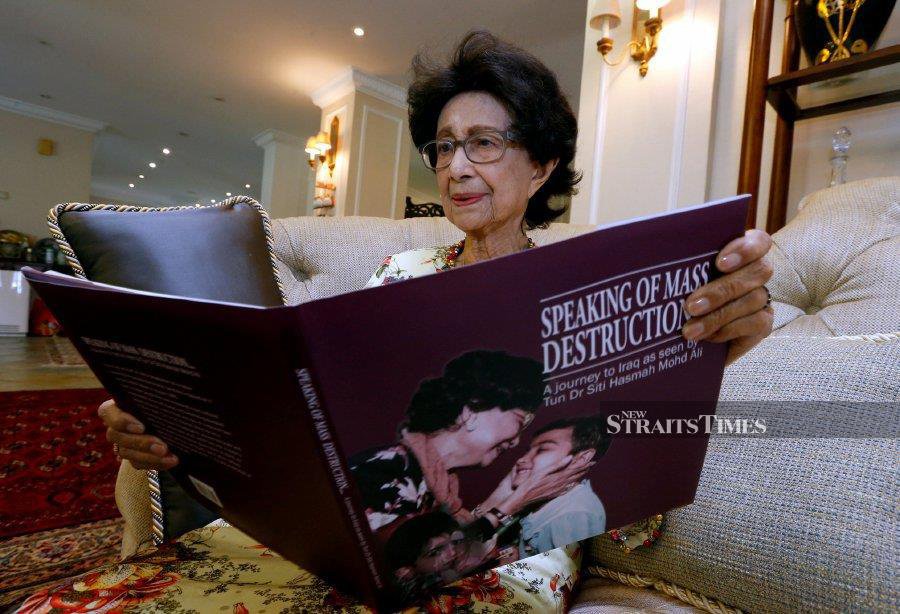
The thudding sound of boxes being unloaded by her porch triggers a pause in our conversation. My puzzled expression is rewarded by an explanation that the boxes contain more copies of Siti Hasmah's books, fresh from the printers. She becomes visibly distracted. Almost time to wrap up, I think to myself, noting the time on my watch.
Tun, last question, I say to her. Why did you feel the need to put this book together, 21 years after it all happened?
Her smile gentle, she replies: "Well, we had so many pictures taken from the trip, thanks to the NST photographer who came with us. Aishah Ali, an NST reporter then, was also there and she'd kept all her cuttings, notes etc. One day, Aishah came to see me to invite me to be a patron for a fundraising event she was organising for Sisters in Islam. One thing led to another and I remember asking her whether we could do a book about what happened in Iraq."
Despite the passing years, Siti Hasmah shares that everything remains crystal clear in her memory. "Reliving all that we saw would never be a problem," she says, adding: "Now that the book is completed, I'm happy. People will now know what happened in Iraq. Wars and sanctions can ruin countries and nations. They killed Saddam, the man whom I held hands with. He's gone, yes, but have conditions in Iraq changed?"
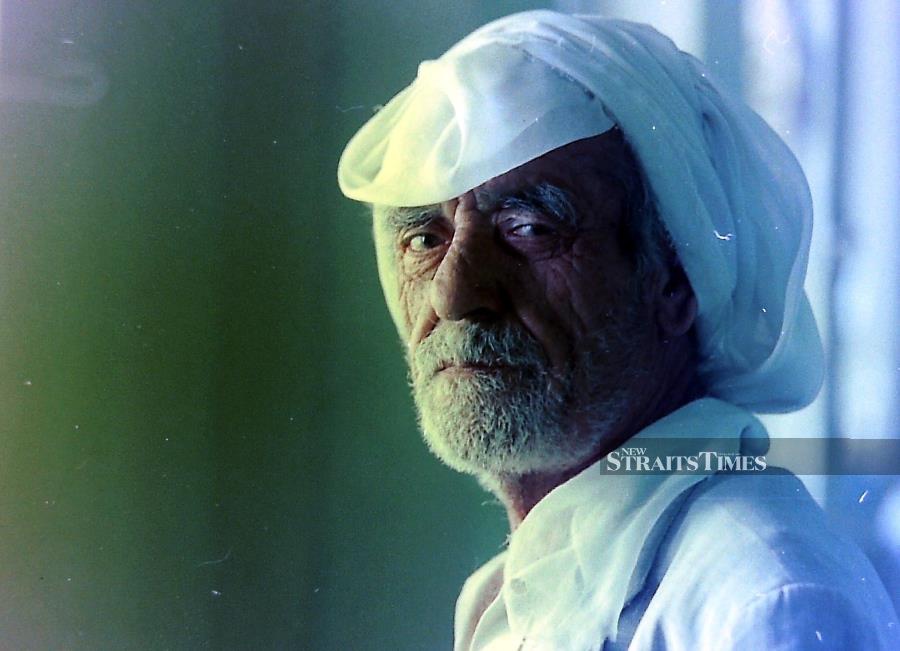
There was another reason for writing the book: To send a strong message to the western powers not to bully small nations and ruin the lives of others for their selfish ends, adds Siti Hasmah, her kindly eyes suddenly looking defiant. Adding she says: "The second message was for the leaders of the Muslim world to help each other. Come together to fight against poverty and injustices."
As far as the Malaysian Cabinet was concerned, what the delegation fed them upon their return was reason enough to call for the sanctions to be lifted, concludes Siti Hasmah with a smile. "France, Russia, China… they were all asking for the same thing. I was truly proud of our small country, Malaysia!"
Speaking of Mass Destruction: A Journey to Iraq as seen by Tun Dr Siti Hasmah Mohd Ali
Author:Tun Dr Siti Hasmah
Pages: 160 pages
Published by: Ali & Ali Medialinks Sdn Bhd
To purchase the book, go to www.speakingofmassdestruction.com/home/


